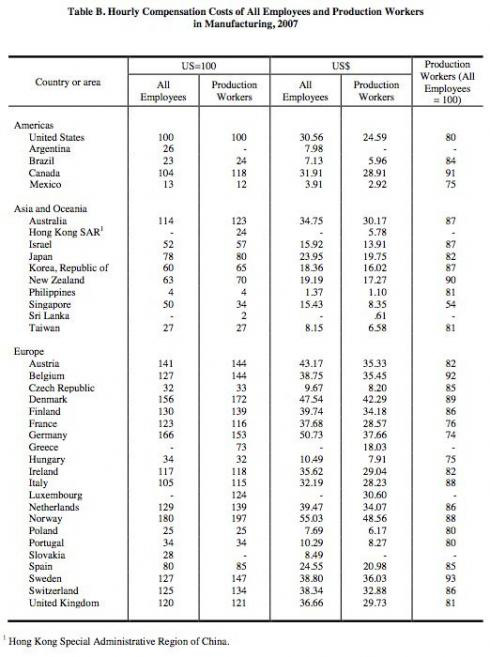
|  |  |  Editorials | Opinions | April 2009 Editorials | Opinions | April 2009  
G-20 Ignored Social "Havens"
 Sylvain Lapoix - Marianne2 Sylvain Lapoix - Marianne2
go to original


| | Some South East Asian hourly labor costs make the relatively affordable Mexican worker pictured here look like a "heinous plutocrat." (Annie Griffiths Belt/National Geographic) |  |
While the G-20 has bragged about dismantling tax havens, social "havens" - where minimal labor costs facilitate factory transfers - persist across the world: Indonesia, Sri Lanka, Mexico... Some have even been inserted into the European Union with complete impunity!

Paradisiacal Asian islands, little Central American states and even European Union member states: "social havens" are legion! While the G-20 has established a black list and two gray lists of countries with minimal taxes on capital and suspicious bank opacity, Marianne2 offers a first draft of a list of social havens.

In these countries where labor costs defy any competition, thousands of companies, including CAC40 French multinationals, come to implant their factories and produce in complete impunity, without regard for the local standard of living and to the detriment of countries that are more particular with respect to social rights.

Governments Know All About It and Do Nothing!

A little tour through the web sites of government agencies proves that the big governments all know about the existence of these places. The American Department of Labor regularly establishes a comparison of labor costs in 31 countries; the International Labor Organization has precise statistics on over a hundred countries; Eurostat establishes comparisons between the 27 Member States' hourly salaries.... In short: the absence of any public stance on this subject is quite deliberate.

Two Euros an Hour in Bulgaria; $0.61 in Sri Lanka

A study by the American Department of Labor on hourly compensation cost clearly points a finger at South East Asia: while the average hourly cost for an American worker is evaluated at $24.59, his Philippine colleague draws only $1.10 and their Sri Lankan alter-ego $0.61. Costs that make the very affordable Mexican (whose hour costs $2.92) pass for a heinous plutocrat.

 Extract from the American Labor Department's Report on World Hourly Compensation Cost. 
But you don't even have to go to Asia to run your factory cheaply: Eurostat establishes that, while it's better to place one's savings than one's assembly line in Luxembourg, where 2006 hourly labor cost was evaluated at 33.30 Euros, Bulgaria, at Euros 1.96 an hour, proves to be a social haven comparable to the most deprived Central American countries, and at less than a three-hour plane trip from Paris!

Currencies, Time Scales and Other Elements of Opacity

But the situation is far too profitable for the big companies which consolidate their margins every year by concealing their factories in social havens.... One element of opacity: the statistics provided to the International Labor Observatory are frequently incomplete, in local currencies, and scaled irregularly in time: how does one compare an Indian day at 134.44 rupees to an annual Jordanian salary of 2,309 local dinars? Not counting the work hours in each country, whether limited or not, workers' ages, possible taxes on work - all of which make the maps of employment flows still more illegible.

The "labor laundering" continues, and with it job flight to these social havens where manufactured products are put together at despicable cost, maintaining those who assemble them in semi-poverty.

The Black List of Social Havens (under two dollars an hour):
• Bulgaria
• China
• Costa Rica
• India
• Indonesia
• Malaysia
• Myanmar
• Philippines
• Salvador
• Sri Lanka
• Vietnam
• Thailand

Gray List of Social Havens (under ten dollars an hour):
• Brazil
• Estonia
• Hong Kong
• Lithuania
• Latvia
• Portugal
• Poland
• Romania
• Slovakia

Far more than tax havens, social havens are at the foundation of the globalized capitalist system that has just gone bankrupt before our eyes. By a diabolical concatenation that may be reconstituted today: by virtue of pulling the labor market down by putting the entire world's manpower in competition, the system has ended up giving rise to the greatest crisis in demand since the Second World War. But since it was necessary for companies to continue to sell, an unprecedented supply of credit was developed, so that people could buy their homes, buy their cars or simply consume to survive. Hence, subprimes, and then, bank failures.

Unfortunately, the G-20 leaders, the Socialists at the IMF, the WTO and the World Bank, the experts who inspire them and the managers they continue to adulate, remain convinced for now that the same fundamentalist free trade that provoked the crisis will allow us to emerge from it.

Translation: Truthout French language editor Leslie Thatcher. |

 |
|  |



